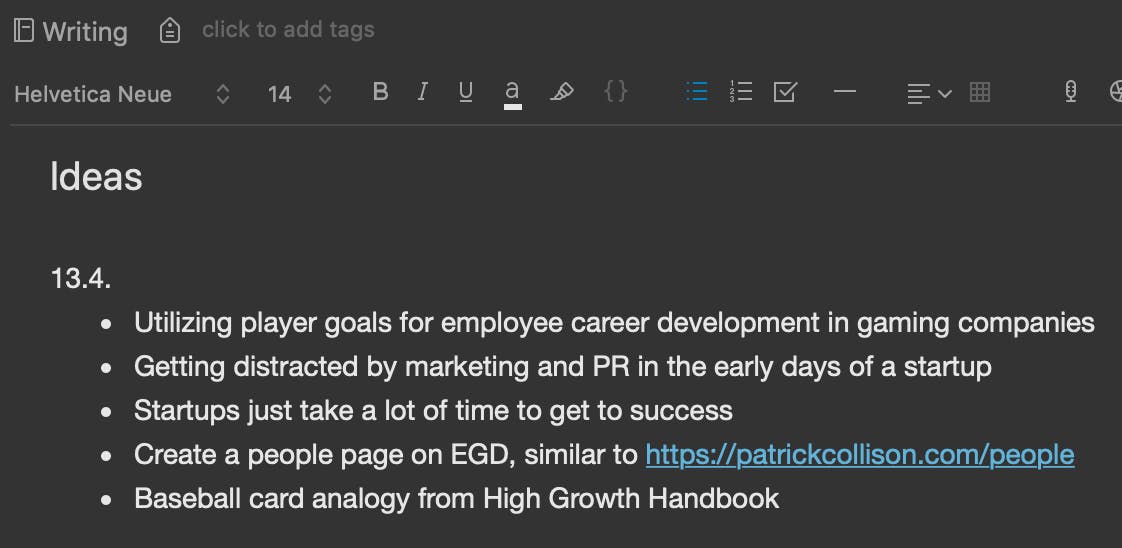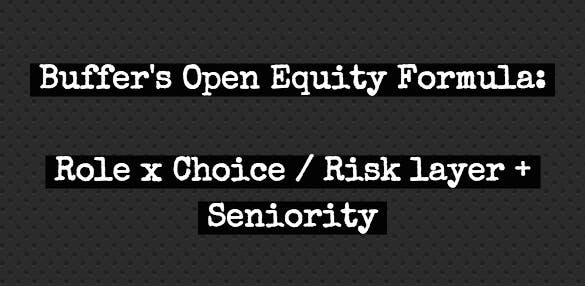EGD News #25
Hi there,
It’s Joakim here. Greetings from Helsinki! We are getting some snow at the moment as I’m writing this. The lockdown has moved to week five.
I wanted to share my plan. I’m trying to share everything that I’ve learned and new things I’m learning with you, and I’m writing one article a week, putting out one podcast episode a week and one newsletter. I’ve expanded to a YouTube channel, and now I’m getting more and more active on Twitter.
Here’s my content creation breakdown for Twitter:
1. I read books, blogs, articles, Twitter at least three hours every day. I listen to podcasts, audiobooks, watch YouTube videos for an additional few hours. During and in between, I get ideas about things I should cover from the gaming entrepreneur’s perspective. I write these ideas down in Evernote, under a note called Ideas. Here’s what my thoughts from Monday 13th of April look like.
 |
2. It’s a backlog of ideas. When I want to write an article, I pick interesting ones from there and then start writing. But, some of these ideas are short and might not at this moment justify a 1,000-word article. But I want to get these ideas out as soon as possible.
3/ Here are a few ones that came out early this year.
 |
My observations of Supercell’s early success. (Tweet)
 |
Experienced gaming people are getting into building their first startup. (Tweet)
 |
Insights on “If I were doing this for the money, I wouldn’t be doing games.” (Tweet)
You can read my recent Tweets, including one of those ideas mentioned above, by following me on Twitter at @joakim_a.
Blog
Allocating stock options — This week, I shared a template for allocating stock options to your employees in your company. Startups can’t compete on salary with more prominent companies, but they have something that big companies can’t offer: attractive stock options to buy shares of the company.
 |
For this template, we use an allocation formula that takes into account the role of the person, their seniority, their choice to prefer equity over salary, and the stage that they joined the company. There’s also an example company in the template, where you can see how a 100-person company would allocate stock options, from pre-seed to series A.
Read the article, watch the instruction video, and get the template from here.
Podcast
Ken Go, DECA Games — I’m amazed about this games company. They’re probably the most innovative games company, especially in the way that they saw how differently a games company could operate. Instead of coming up with game concepts and then building them, Ken’s team seeks older mobile games and then acquires those games from the developers. After they have the game, they apply all their live ops know-how to breathe life into the game, extending the game’s lifespan by years.
In this episode, we talk about Ken’s background and how he was able to convince the first studios to give up their titles. Ken has built a fantastic business, which now comprises of eight different games, including games like Realm of the Mad God, Zombie Catchers, Crime City, and Dragon Vale, which they’ve acquired from the original developers.
One of the biggest challenges that gaming startups face is getting the right people on board. You start by having the best possible founding team in place. They complement each other’s skills, and they’re aligned with similar ambitions for the future of the company.
After the founding team, you start recruiting employees. When the company grows, how do you build the right teams and create a culture where people can thrive? I created this lecture video to go through the tools and processes that I believe are crucial for success in building teams. Please share your thoughts and feedback in the comments section.
Watch the lecture video here.
Articles Worth Reading
+ 25 ways to keep a great culture fully remote — I’ve often shared these incredible articles that Mathilde Collin, the CEO of Front, writes on Medium. This one is no different, unusual, as always. Here she shares how the company has transitioned to become fully remote in the past month. The ideas that they share are around communication, employee benefits, culture events, encouragement, and remote work resources. My favorites from these are the 24/7 Zoom room, ask-me-anything sessions, and the work from home benefits.
+ RPG systems and metagames — Jeff Witt wrote a breakdown and analysis of Archero’s metagame. The ideas in this article take me back to working on RPG systems in free-to-play. It can be challenging to layer more and more character systems into your game, without bloating the game and making meaningful session-based progress disappear from the end-game players. If you are fascinated with a simple RPG game like Archero, you should read this article and learn.
+ Mobile F2P games are a form of luxury goods — An exciting new take on mobile free-to-play here in this article from Alexandre Macmillan. In his words: “It feels like paying for something non-essential when you don’t even need to spend to engage with it is the ultimate luxury. Maybe we can shift our perspective a bit and consider IAP monetization in mobile games more like a form of a luxury than a form of entertainment.”
+ Antifragile idea generation — What is that? It’s a concept that John Carmack, co-founder of id Software and lead programmer of games like Commander Keen, Wolfenstein 3D, Doom, and Quake, coined a few years ago at his talk at Facebook. Carmack talks about antifragile idea generation as a way to “punch holes to your ideas to not make them work.” Here’s what a system like this would look like:
1. You are working on a problem. You get an idea and an initial idea high
2. You should instantly try to defeat your idea — think of all the ways it couldn’t work, test it out, put it under stress
3. If the idea survives the brutal scrutiny, it has legs for further investigations or implementation4. If the idea is implemented and it works then that’s great!
5. If the plan fails the scrutiny or implementation, you can quickly move on to the next idea without feeling the lows because you haven’t obsessed or talked about it i.e., it’s not your pet idea.
+ COVID-19, movies and TV — Now that movie theaters around the world are closed, and film crews can’t work at set locations, what is happening to the film and TV? If you want a quick overview of how the entertainment industry is being affected by COVID-19, watch this informative Variety video.
Quote that I’m thinking about
“The thing that I like to assume is every startup idea’s been tried… So, the question is not, has my idea been tried before? The question is, is it the right time for my idea to happen?” — Mike Maples, Jr.





